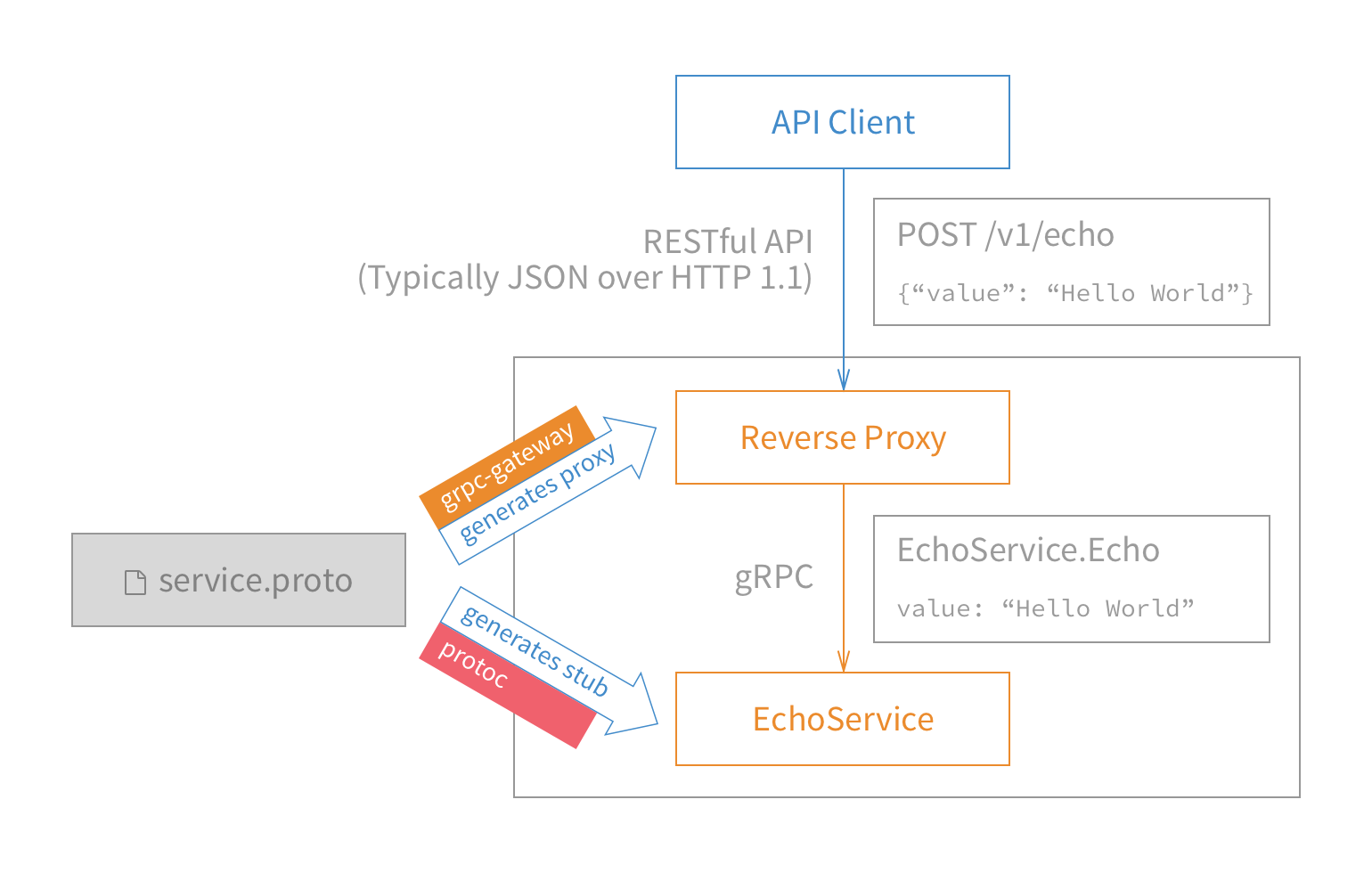使用grpc的优点很多,二进制的数据可以加快传输速度,基于http2的多路复用可以减少服务之间的连接次数,和函数一样的调用方式也有效的提升了开发效率。
不过使用grpc也会面临一个问题,我们的微服务对外一定是要提供Restful接口的,如果内部调用使用grpc,在某些情况下要同时提供一个功能的两套API接口,这样就不仅降低了开发效率,也增加了调试的复杂度。于是就想着有没有一个转换机制,让Restful和gprc可以相互转化。
在网上看到一个解决方案,https://github.com/grpc-ecosystem/grpc-gateway,简单的说就是有一个网关服务器负责转化和代理转发。
如下图:
安装
首先要安装ProtocolBuffers 3.0及以上版本。
mkdir tmp
cd tmp
git clone https://github.com/google/protobuf
cd protobuf
./autogen.sh
./configure
make
make check
sudo make install然后使用go get获取grpc-gateway。
go get -u github.com/grpc-ecosystem/grpc-gateway/protoc-gen-grpc-gateway
go get -u github.com/grpc-ecosystem/grpc-gateway/protoc-gen-swagger
go get -u github.com/golang/protobuf/protoc-gen-go这里最好把编译生成的二进制文件的目录放在$PATH中,可以把$GOPATH/bin放入$PATH中。
示例
本示例是基于我的上一篇博客《google的grpc在glang中的使用》中的示例,如果有必要请先了解上一篇博客。
示例代码获取地址:https://github.com/andyidea/go-example。
代码文件结构如下
└── src
└── grpc-helloworld-gateway
├── gateway
│ └── main.go
├── greeter_server
│ └── main.go
└── helloworld
├── helloworld.pb.go
├── helloworld.pb.gw.go
└── helloworld.proto
我们还是先看一下协议文件。helloworld.proto有一些变动,引入了google官方的api相关的扩展,为grpc的http转换提供了支持。
具体改动如下:
syntax = "proto3";
option java_multiple_files = true;
option java_package = "io.grpc.examples.helloworld";
option java_outer_classname = "HelloWorldProto";
package helloworld;
import "google/api/annotations.proto";
// The greeting service definition.
service Greeter {
// Sends a greeting
rpc SayHello (HelloRequest) returns (HelloReply) {
option (google.api.http) = {
post: "/v1/example/echo"
body: "*"
};
}
}
// The request message containing the user's name.
message HelloRequest {
string name = 1;
}
// The response message containing the greetings
message HelloReply {
string message = 1;
}和之前的proto文件比较,新的文件增了
import "google/api/annotations.proto";和
option (google.api.http) = {
post: "/v1/example/echo"
body: "*"这里增加了对http的扩展配置。
然后编译proto文件,生成对应的go文件
cd src/grpc-helloworld-gateway
protoc -I/usr/local/include -I. \
-I$GOPATH/src \
-I$GOPATH/src/github.com/grpc-ecosystem/grpc-gateway/third_party/googleapis \
--go_out=Mgoogle/api/annotations.proto=github.com/grpc-ecosystem/grpc-gateway/third_party/googleapis/google/api,plugins=grpc:. \
helloworld/helloworld.proto 这里生成了helloworld/helloworld.pb.go文件。
helloworld.pb.go是server服务需要的,下一步我们需要使用protoc生成gateway需要的go文件。
cd src/grpc-helloworld-gateway
protoc -I/usr/local/include -I. \
-I$GOPATH/src -I$GOPATH/src/github.com/grpc-ecosystem/grpc-gateway/third_party/googleapis \
--grpc-gateway_out=logtostderr=true:. \
helloworld/helloworld.proto这里生成了helloworld/helloworld.pb.gw.go文件。这个文件就是gateway用来的协议文件,用来做grpc和http的协议转换。
协议文件处理完毕,就需要写gateway代码了。
gateway代码如下:
package main
import (
"flag"
"net/http"
"github.com/golang/glog"
"github.com/grpc-ecosystem/grpc-gateway/runtime"
"golang.org/x/net/context"
"google.golang.org/grpc"
gw "grpc-helloworld-gateway/helloworld"
)
var (
echoEndpoint = flag.String("echo_endpoint", "localhost:50051", "endpoint of YourService")
)
func run() error {
ctx := context.Background()
ctx, cancel := context.WithCancel(ctx)
defer cancel()
mux := runtime.NewServeMux()
opts := []grpc.DialOption{grpc.WithInsecure()}
err := gw.RegisterGreeterHandlerFromEndpoint(ctx, mux, *echoEndpoint, opts)
if err != nil {
return err
}
return http.ListenAndServe(":8080", mux)
}
func main() {
flag.Parse()
defer glog.Flush()
if err := run(); err != nil {
glog.Fatal(err)
}
}
首先echoEndpoint存储了需要连接的server信息,然后将这些信息和新建的server用gw.go中的RegisterGreeterHandlerFromEndpoint进行一个注册和绑定,这时低层就会连接echoEndpoint提供的远程server地址,这样gateway就作为客户端和远程server建立了连接,之后用http启动新建的server,gateway就作为服务器端对外提供http的服务了。
代码到此就完成了,我们测试一下。
先启动greeter_server服务,再启动gateway,这时gatway连接上greeter_server后,对外建立http的监听。
然后我们用curl发送http请求
curl -X POST -k http://localhost:8080/v1/example/echo -d '{"name": " world"}
{"message":"Hello world"}流程如下:curl用post向gateway发送请求,gateway作为proxy将请求转化一下通过grpc转发给greeter_server,greeter_server通过grpc返回结果,gateway收到结果后,转化成json返回给前端。
这样,就通过grpc-gateway完成了从http json到内部grpc的转化过程。
标签:http,grpc,helloworld,server,go,gateway From: https://www.cnblogs.com/596014054-yangdongsheng/p/10803351.html